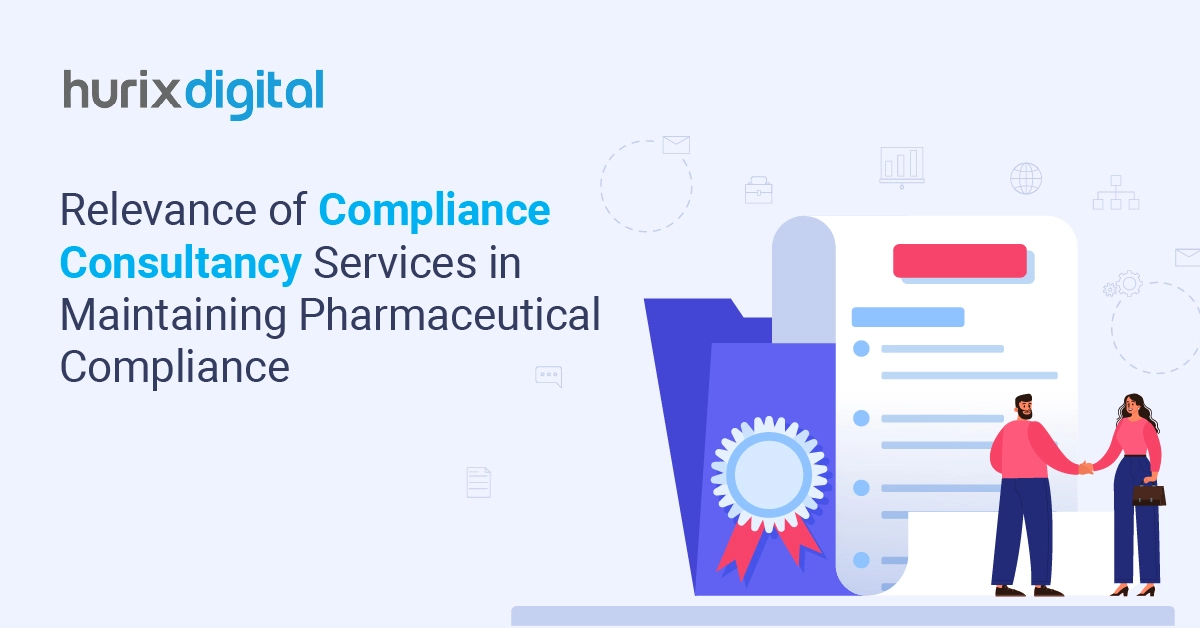
Relevance of Compliance Consultancy Services in Maintaining Pharmaceutical Compliance
Summary
This article discusses how pharmaceutical firms ensure compliance via programs, audits, training, data security, environmental standards, quality checks, and expert consultants.
The pharmaceutical industry is extremely regulated. They have several compliance parameters and legal requirements to follow. It is integral for pharmaceutical businesses to maintain product safety and ensure public protection. This will help them build brand value and avoid non-compliance-related penalties.
There are several ways for pharmaceutical businesses to maintain compliance, one of which is collaborating with a compliance consultancy. By doing so, you can leverage consultants’ expertise and professional guidance and mitigate compliance risks effectively.
Let us look into the top ways to ensure and explore the various ways in which pharmaceutical businesses can maintain compliance. We will also tap into the relevance of compliance consultancy companies!
Table of Contents:
- Types of Pharmaceutical Compliance Risks
- How to Mitigate Pharmaceutical Compliance Risks
- How Compliance Consulting Companies Reduce Pharmaceutical Compliance Risks
- Conclusion
Types of Pharmaceutical Compliance Risks
Some of the most critical compliance risks associated with the pharmaceutical businesses are:
- Regulatory Non-Compliance Risks: Any kind of non-adherence to national and international regulations can lead to severe penalties. It is important to consider laid out rules and regulations related to:
- Drug approval
- Labeling, promotion, and advertising
- Manufacturing
- Maintenance of quality standards
- Conducting and reporting trials
- Other risks include:
- Violations of anti-bribery laws.
- Non-compliance related to data protection.
- Non-compliance with environmental regulations. It is best to collaborate with an environmental compliance consultancy and reduce the impact of such hazardous processes.
- Noncompliance related to Supply Chain Management
- Intellectual Property Risks
- Risks associated with the safety of products
- Nonadherence to trade regulations and other compliance requirements.
Also Read: Inclusive Learning to Address the Diverse Needs in Workforce Development
How to Mitigate Pharmaceutical Compliance Risks
It is critical to maintain compliance in pharmaceutical businesses for the following reasons:
- Organizations need to meet all legal and regulatory requirements, which helps them maintain compliance throughout different areas and avoid fines and sanctions.
- They must maintain high standards of product safety, which can build the company’s reputation.
- The industry needs to follow ethical practices and meet global regulatory standards.
- Compliance with rules and regulations streamlines processes and reduces the likelihood of disruptions.
Here are some key strategies to reduce compliance risks effectively:
1. Create Robust Compliance Programs
All pharmaceutical companies must develop and implement comprehensive compliance programs internally. It is equally important to update programs regularly according to industry standards.
2. Regular Training and Education
Organizations must conduct training sessions for employees at all levels. This will help key stakeholders understand regulatory requirements and internal policies.
3. Internal Audits and Monitoring
Pharmaceutical businesses must perform regular internal audits to identify compliance gaps. Before these gaps turn into high compliance risks and lead to high penalties, it is important to detect and correct these issues. Businesses can use advanced monitoring systems to identify non-adherence to compliance regulations.
4. Adverse Event Reporting Systems
All pharmaceutical companies need to report any kind of incident or malfunction. For this, it is significant for them to develop appropriate systems so that they can accurately report adverse events.
5. Data Integrity and Privacy Protection
Data is crucial in the pharmaceutical business, whether it is patient data, product data, or internal organization data. Pharmaceutical companies must implement stringent data protection measures to comply with regulations.
6. Environmental Health and Safety Compliance
It is integral to formulate programs within the organization to follow environmental regulations. Such regulations are significant in the pharmaceutical business because more than 100,000 tonnes of pharmaceutical products are consumed globally every year.
Several chemical ingredients are released into the environment during their manufacture, use, and disposal. Research has also detected pharmaceuticals in various forms in the environment. This needs to be controlled with adherence to compliance measures.
7. Quality Control Systems
Every organization must maintain quality control systems and consider changes in industry standards. It is important to incorporate the latest laws and changes related to the industry and consider the latest market trends.
8. Collaborate with a Compliance Consulting Firm
It is integral to partner with compliance consultancies. The professionals are well-equipped with resources to offer appropriate guidance related to adherence to compliance risks.
How Compliance Consulting Companies Reduce Pharmaceutical Compliance Risks
Here is how compliance consultancy services help pharmaceutical companies mitigate compliance risks:
1. Regulatory Expertise
Consultancies have experts who understand the complex web of regulations across different regions. They can help companies interpret and apply these regulations correctly as they are well aware of regulatory changes. The professionals can ensure that companies stay compliant according to the latest requirements.
2. Risk Assessment and Management
Compliance consulting service companies help organizations maintain a risk-free environment by conducting thorough risk assessments. These measures help the experts identify compliance risks, after which they implement key strategies to rectify them effectively.
3. Compliance Audits and Monitoring
compliance consultancy services help in performing regular internal audits to ensure compliance. The experts further establish ongoing monitoring programs to detect and address compliance issues proactively.
4. Policy Development and Implementation
Every pharmaceutical company needs to create and follow comprehensive compliance policies and procedures.
The experts of a compliance consulting firm help fulfill specific needs and, based on the requirements, create, implement, and monitor these policies across the organization. They also conduct proper training sessions to ensure that all employees understand these compliances and adhere to them.
5. Training and Education
It is extremely crucial to educate all employees and key stakeholders within the pharmaceutical organization to understand regulatory requirements. The compliance consultancy services include healthcare compliance training for employees. They also train the top management and discuss their roles in maintaining this culture.
6. Adverse Event Reporting Systems
They have the right resources and technologies to help you develop robust systems for reporting adverse events related to pharmaceutical products. According to a study, pharmaceutical manufacturers must integrate digital transformation into facilities and embrace digital transformation by integrating AI and digital twin technologies. This will encourage resilience within the industry and encourage sustainable supply chains.
7. Legal Compliance
A compliance consulting firm helps pharmaceutical companies establish a robust compliance framework in the industry. Here are the legal compliances that are augmented, reviewed, and checked by the consultancies:
- Review marketing and promotional materials to ensure they comply with regulatory standards.
- Implement data protection programs.
- Prevent unethical behavior and ensure that the suppliers also meet compliance standards.
- Ensure compliance with environmental regulations and also help protect intellectual property.
- Implementing influential quality control systems to ensure product safety.
- Make sure that public-related and organization-related sensitive data is protected.
Also Read: The Impact of AI and Automation on Workforce Development Trends
Conclusion
Considering the critical nature of the pharmaceutical industry, countering compliance risks is imperative. Such measures will help the industry maintain its brand credibility, public trust, and top-notch customer service. It is integral to seek the assistance of specialized compliance consulting service companies, as the experts can help you deal with compliance-related complexities more effectively.
The professionals can offer regulatory expertise and conduct regular risk assessments to develop policies, offer training, and perform audits. Pharmaceutical companies should make the most of their comprehensive solutions to remain compliant with industry standards.
For assistance in digital content solutions, technology solutions, and immersive learning, contact Hurix Digital. We are committed to driving innovation, compliance, and a customer-centric approach within the pharmaceutical arena, which empowers enterprises.
So what are you waiting for? Get in touch with us today!

A highly enthusiastic and motivated sales professional with over twenty five years of experience in solution selling of training-related applications and services. Maintains an assertive and dynamic style that generates results. Ability to establish long-term relationships with clients built on trust, quality of service and strategic vision. Specializes in financial services, higher ed, publishing and government in the areas of learning and development.



